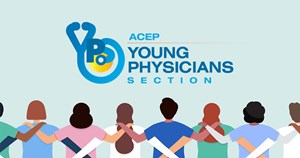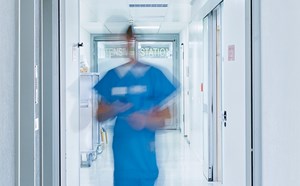Fellowship Spotlight: Clinical Innovations with Dr. Leubitz
In this new video series, ACEP's Young Physicians Section explores the diverse world of emergency medicine fellowships. This episode features Andrew Leubitz, DO, MBA a National Clinician Scholars Program Fellow. Watch the video for a quick overview of his role and keep reading for more details about his fellowship experience.
YPS: Tell us a little bit about the fellowship and walk us through your day-to-day. What does that look like for you?
Dr. Leubitz: The actual title of the fellowship is the Clinical Innovations Fellowship through US Acute Care Solutions (USACS) which is one of the larger staffing firms for emergency hospital ICUs in the country. My typical clinical day hasn’t changed much. I work as an attending in the hospital so I’m really not a Fellow in that respect. – I’m acting on my own. I do have reduced hours, so I have protected time to do more Fellowship work. I have different projects. For example, this week I'm working on a legal module and reviewing different state psychiatric hold laws and legislation and working with our clinical governance board to make sure doctors have up-to-date resources in order to not only protect the patient, but to protect yourself medically legally too.
There are some nuances too that you just don’t learn in medical school or residency. I’m currently working with a podcast in more of an academic realm, which is my interest. I don’t currently have any residents in my program but there will be nine residency programs that we work with so I’m working with current residents and faculty to do some podcasting for them to become a digital scholarship. I’m working on a board review session for senior residents taking their IT exam later this month. We’re doing regional journal club, some conference planning, working on writing for EMRA and ACEP and a book-of the-month club with a co-fellow where we take different aspects of hospital and emergency medicine management and discuss them with our clinical faculty, Dr. [Jesse] Pines.
YPS: What's unique about your fellowship?
Dr. Leubitz: It allows a seat at the table pretty early on. Not many have access to the CEO of their hospital or company as a resident. They know we’re fellows and they want us to be successful and thy want us to find clinical interests outside of the hospital to make the ER better. For example, earlier this month I went to Harvard for a Leadership medical conference and I met not only with doctors, but also with insurers, payers and different institutions on how to best serve patients, as it’s not always about the medicine and fortunately or unfortunately reality sets in and you have to learn how to work the system in order to improve the quality of care you give your patients. And that often starts with understanding how money works. It’s frustrating but it’s “how the sausage gets made” and you have to understand how to play the game.
Mostly right now I’m working on projects on how to organize medicine, how to create calm from chaos and how to actually make change. It’s not just having an idea. It’s implementing change and making different nuanced things at a systemic level. We got to go to ACEP National in Dallas and participate in the Emergency Department Directors Academy and not only have access to the network of people you meet, but also people from all parts of emergency medicine – community hospitals, academic hospitals, rural and urban, level one through critical access. Seeing what the problems are and how they’ve been solved. Many of those solutions are brought back to our table and are implemented. Change is slow but I’ve learned that it’s okay and it’s okay to communicate and keep communicating ideas, understanding how to give and receive feedback as a leader in the field. Mostly I’ve learned that whether you’re in residency or in medical school – everyone is a resident or everyone is a medical student and you’re surrounded by your peers. But when you’re out in the real world, everyone looks up to you as a doctor and cares about the nuances such as wait times and boarding times that really do matter and really do affect patient care.
YPS: What has surprised you about it?
Dr. Leubitz: I thought my career would be pretty academic – that I would enter a residency program and work my way up from there. But what I’ve learned is that I like a little bit of everything. That it’s about having a passion, but also that not everyone cares about what you care about. I work with a really good team and it’s not hard to keep wanting to improve and help people and make things better because if you don’t – if no one does, then everything is going to be status quo and nothing is going to change. You have to find out who your supporters are, who you know, the issues you’re fighting. As an ER doctor, we see everything and we’re the safety net. We see everything. We see the flaws in the system. How can we best address those? One project I’m working on is dealing with chronic kidney failure and preventing emergency dialysis. It doesn’t have to be like that. A lot of it is knowing how to work within the network and getting those patients where they need to go. How to engage with them so they become their own patient advocates and make them better patients. A lot is learning how the healthcare system works and the more I learn, the more I’m learning what I don’t know.
YPS: What's your favorite part about it, and what's your least favorite part?
Dr. Leubitz: So one of my favorite parts – my goals - is to work in academic emergency medicine, to work with a residency program and I don’t currently work at a hospital [geographically] that has that. But I do have access to academic chairs who work with all of our residency programs and I’ve been welcomed with open arms and have been allowed to work on any project I’ve wanted to and have been invited to work on a lot of other projects with other residents so I’ve gotten that academic connection in a community hospital setting.
My least favorite part is the fact that there’s a lot of writing involved and I’m not a passionate writer. It’s a matter of putting your head down and doing the work but it’s easy to get distracted to want to go work a shift or something else. However, it has given me more of an appreciation for scheduling – there’s time, you just have to do it. I think the hardest part is just sitting for an hour – that’s really the issue.
For me, this is part of my building blocks. I got my MBA during medical school as I was fortunate to be a part of a dual DO-MBA program. So it helped me, but it was about the business building blocks, it wasn’t about the business of medicine or medicine education. This fellowship is the second part of that education. I like to think that some of the larger programs will have a combined MPH, MBA or something like that within the fellowship but it’s usually two years. This is a one-year program. I do plan on doing something within ED administration at some point, possibly advocacy or working on other specific issues or working within my local staffing firm or local hospital group. I like to be part of the discussion on how things are happening, which I think is part of the nature of an ER doc. But being part of the conversation goes back to our patients and how it’s going to affect them. The biggest question I get is not about the disease process or what antibiotics I’m going to use It’s “when am I going upstairs?” “How long is this going to take?” We want to make sure the medicine is right – that’s first and foremost. But it’s also not necessarily about customer service, but it’s about getting the best hospital care experience, which I’ve learned to appreciate more and more. People give a lot of flack on patient satisfaction surveys and sometimes it’s ridiculous that four months after the fact you get a 30 -question survey. Regardless, if you really want to be the place where patients want to come to get care, you need to treat them with respect. And part of that respect includes knowing how long things will take, knowing how to explain that to them, and knowing who to call to make things happen. It’s easy to complain to a CEO about wait times being 40% longer. But if I see them in the elevator and I say “please come out and meet Mrs. Smith – she and her husband have been waiting for four hours, what can we do about it?” that impact and those connections go a lot further than reading numbers on a chart.
YPS: Do you have any advice for others who may be interested in a research fellowship?
Dr. Leubitz: Absolutely. It’s not the pro-typical fellowship, but it’s definitely a unique opportunity. This is the only fellowship of innovation that I know about and I found out about it through reading a couple articles from our director and got to know Dr. Pines personally. It’s a great opportunity if you want to do more in the younger part of your career than just working in the ER and that is okay and is certainly applauded.
A lot of people think it’s a four-year residency, do I want to tack on another year especially not getting an attending’s salary and loans are coming due. There are a lot of factors to consider but I’ve learned a lot and I’ve enjoyed it. It’s a finite set of time and it’s one year of my life. The connections I’ve made and the lessons I’ve learned and the opportunities that are open to me are pretty remarkable. I plan on continuing on a lot of these projects post-fellowship and I feel like it will help with what my career path wants to do. I think there’s no set one direction for anyone, and a lot of people like me are in the same boat as we like different things – we like advocacy work, advocacy work, patient care. You like little bits of things and it sets you up for success and you can make your own career. The more access you have, the more one-on-one time you have, the more people will allow you to do. If anyone is interested I’m happy to talk about it, whether it be this specific fellowship or any other.



